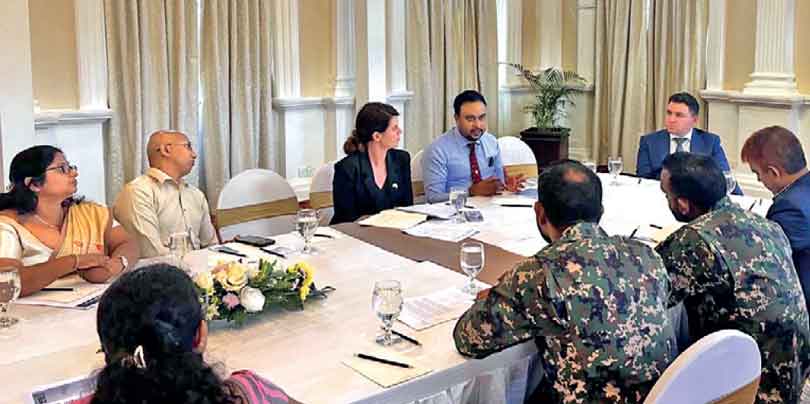Sunday Feb 22, 2026
Sunday Feb 22, 2026
Tuesday, 10 December 2024 03:32 - - {{hitsCtrl.values.hits}}

Regional participants engage in a practical exercise during the Sub-Regional CBRN Response Workshop in Colombo

Expert participants from Sri Lanka, Bangladesh, India, Maldives and the United States gathered in Colombo 3-5 Dec. to exchange knowledge on emergency preparedness and response
|
Assistant Legal Attache Damian Walke, an official from the US Embassy in Manila discusses strategies for emergency preparedness at the workshop
|
The US Embassy in Colombo, in collaboration with Sri Lanka’s Disaster Management Centre, hosted a three-day regional workshop from 3 to 5 December to improve readiness for Chemical, Biological, Radiological, and Nuclear (CBRN) emergencies.
The event brought together 40 participants from Sri Lanka, Maldives, Bangladesh, India, and the United States to focus on saving lives, protecting the environment, and reducing harm during emergency situations.
The Sub-Regional CBRN Response and Assistance Workshop, “SR2 Sri Lanka,” emphasised cooperation and coordination during emergencies. Experts from security, defence, health, environmental protection, disaster management, and international affairs sectors shared experiences and participated in a practical tabletop exercise simulating a regional CBRN emergency response.
Roy Baran from the US Department of State’s Bureau of International Security and Nonproliferation stated, “In times of major crisis, regional collaboration and timely sharing of information is critical to an effective and rapid response. We must prepare ourselves for every scenario, which includes ensuring that we can respond to any CBRN incident in the region – to save the lives of our people, maintain our economies, and protect our way of life.” Sri Lanka’s Disaster Management Centre Director General Major General H.M.U. Herath (Rtd) highlighted both the relevance of the CBRN risk and Sri Lanka’s commitment to preparedness, stating, “In Sri Lanka a variety of chemical, biological, radiological, nuclear and explosive (CBRNE) agents are used in various manufacturing industries and medical institutions and related incidents can be not only terrorist acts, but technological accidents triggered by natural hazards. The Disaster Management Centre has initiated an integrated program for CBRNE disaster risk reduction with the approval of the Ministry of Defence, and has established a national level platform with relevant stakeholder agencies and analytical techniques to identify available strengths, weaknesses, opportunities, and threats.”
The workshop highlighted the need to invest in CBRN preparedness, the importance of continued exercises to practice responding to a major crisis, and the value of working together with regional partners. Participants were also encouraged to explore potential areas for future regional cooperation based on the response capabilities and gaps of the participating nations. The workshop is part of a series of events led by the Office of Weapons of Mass Destruction Terrorism in the Bureau of International Security and Nonproliferation at the US Department of State and is designed to enhance international cooperation to deter and defend against the increasing use of CBRN weapons globally.